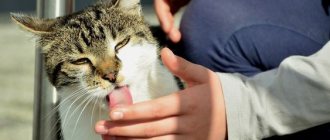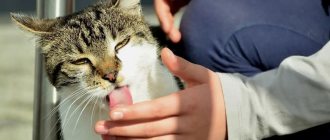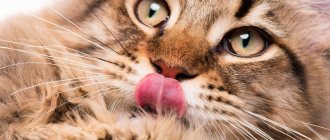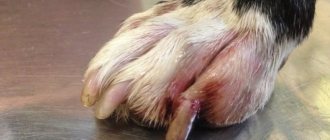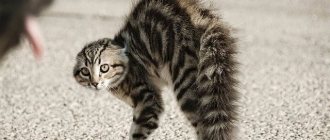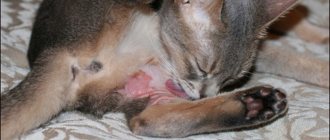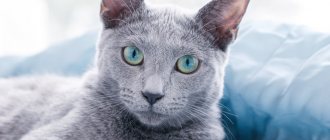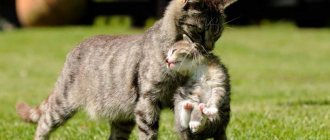Cats are clean animals, but due to their special constitution, they simply cannot lick some areas of their fur. In this case, a cohabitant comes to the rescue, who is also not against mutual “cleaning”.
This explains the fact that when a cat is stroked in places that are not difficult to lick, he sometimes begins to get angry, show aggression and dissatisfaction, but if you scratch behind the ear or under the neck - so please!
Social connection
In 2004, a study was conducted on social interaction between stray cats. Scientists have noticed that allogrooming is typical for cats that already have established relationships with each other. “Strangers” did not show such behavior - in other words, the cats did not want to care for other animals that were unfamiliar to them, which is quite logical.
The researchers also concluded that those affected by allogrooming tend to be very friendly, purring, and tilting or turning their heads. They can expose the back of their head or the top of their head, that is, those parts of the body that are difficult to care for independently. This behavior may be motivated by a need for help regarding hygiene.
Main reasons
Cats are one of the most independent and self-sufficient pets you can keep at home. Some people periodically feel like they are the ones living with their animal, and not the other way around, they behave so proudly. Therefore, when pets start licking their hands, many people want to think that this is only because of strong love and affection. However, this is not entirely true; there are also other reasons for this.
Expressing affection and care
This behavior is one of the main reasons for licking the head, hands, face, and hair of its owner. A cat avoids people who, for one reason or another, are unpleasant to them. This could be a smell, a neglectful or rude attitude towards an animal, and many others. Therefore, if a pet shows sympathy in this way, there is no need to scold or drive him away. This behavior will cause the animal to lose trust. When it becomes uncomfortable from prolonged licking with a rough and wet tongue, you should not drive the cat away, but divert his attention to a treat or toy.
Maternal instinct
After birth, when kittens are still blind and deaf, they communicate with their mother through tactile interactions. Cats lick their offspring many times a day. This moment remains in the memory of animals for life. When they reach puberty, but do not have kittens for one reason or another, they thus demonstrate maternal instinct. Cats begin to lick their owner, thereby replacing the care of kittens. This seems funny and cute, but this behavior should alert the owner; it can harm the health of the pet. In this connection, veterinarians recommend sterilizing animals at the age of less than 12 months, if matings are not planned in the future.
Lack of attention
When the owner does not give his pet enough attention, this is fraught with damage to furniture, torn wallpaper and loss of mutual understanding with each other. Particularly active individuals can even bite a person. There are several signs that your cat wants affection or play that should not be ignored:
- flattens ears;
- nuzzles hand;
- licks the owner's nose and face.
The pet can lie flat on the floor at the owner’s feet and turn one side or another, as if showing an area of the body where it needs to be stroked or scratched.
Many cats enjoy having their foreheads and ears scratched. Moreover, the fur on the forehead should be stroked against growth, and the ears can be pulled a little. Some pets love it if their belly is touched, others cannot stand it. During molting, animals love to be combed, which is also worth taking into account.
If, when caressed by the owner, the cat begins to purr gently, this indicates that she is happy with everything and is enjoying herself.
You can start stroking without waiting for a call from your pet, but take the initiative yourself. To do this, you need to bring your hand to a distance of about 10 cm from the animal and scratch it nearby; if it reaches out and begins to rub against the owner, then the call for affection has been accepted.
Cat dominance
When licking, sometimes a cat shows its dominant role in the family. In this way she means that this person is her property. At the same time, the pet leaves its scent on the owner. If there are no signs of aggression, there is no need to fight this, as this is normal, because it is not for nothing that everyone knows that a cat is one of the most independent pets.
Anxiety and stress
With increased anxiety and stress, a cat often begins to lick itself and its owner. If such behavior has not been noticed before, or if it was much less so, you need to show the animal to a veterinarian, because this is a symptom indicating the presence of some pathology.
Another reason for this behavior is the animal’s low self-esteem. Licking the owner is a way to win him over and keep him safe. At the same time, the pet is tense and will constantly expect a trick, rather than enjoy communicating with the owner.
Boredom
Some animals, often and for a long time being alone, try to have fun on their own. Some start eating a lot, while others start licking. This is a way to cope with boredom. First, they constantly carry out the washing procedure, and then switch to the owner’s things, as well as hair, hands, face, and the person himself. Sometimes animals go so far as to lick until the hair falls out, followed by the formation of a wound in this place that constantly gets wet. At the same time, they do not stop licking, even in such critical situations.
If this happens to pets, you need to seek veterinary help.
Naturally pungent odor from the owner
Cats have a very highly developed sense of smell, so they can lick the hands, feet, and armpits of their owners who come in the evening after work. The fact is that the smell of sweat formed on the human body during the day is a bait for animals. And by licking it, pets try to protect their owner from persecution by other animals and encroachment on their territory.
Licking is associated with higher rank
Another, earlier study found that in most cases, higher-ranking cats groom lower-ranking ones. In this case, most often those animals that are licked sit or lie, while those caring for them take higher positions - standing or sitting upright. A cat, without resorting to fights and other aggressive actions, can show its dominance by licking another.
Symptoms of diseases
There are cases when licking people is a desire to draw attention to the pet’s health problems, and not a show of love or a request for affection. These may be diseases or conditions such as:
- Skin parasites, including fleas. The cat worries not only about itself, but also about the people around it, and is trying to get rid of the problem.
- Allergy. If feeding is incorrect or the food is changed, skin problems can occur, which leads to excessive licking of yourself and those around you.
- Disturbances in general health. By licking frequently, the animal tries to signal that something is wrong with it. It is important to notice changes in behavior and contact a veterinarian promptly.
- Infectious diseases. Some of them cause itching and rashes on the skin, which irritates the pet and he tries to get rid of it in this way.
Cat licks dog
As for the question of a cat licking another cat, it becomes clearer. But how can we explain the behavior of a cat when it licks a dog? Some owners notice that the cat rubs its muzzle and body against the dog. First of all, this is a kind of markup.
There are specific glands in the corners and around the cat's mouth. They are also located in the temporal region. During friction, the glands open, and a specific secretion remains on the object that the animal rubs against. Glands are also located at the base of the tail.
An interesting fact, proven by animal psychologists, is that cats that feel stronger in the hierarchical ladder lick the weaker ones, proving their dominance. A cat can also lick its owner in response to stroking, thereby showing their gratitude.
Due to the large flow of incoming questions, free veterinary consultations are temporarily suspended.
How to evaluate such behavior?
In some cases, through a bite, cats demonstrate to their owners that they are sick or experiencing significant discomfort. Whiskers often lick, in particular, painful or damaged areas of the body. When the owner accidentally touches a sensitive area, the pet may bite.
As for biting and licking at the same time, experts are quite optimistic. Some minke whales, while carefully licking loved ones, themselves receive incredible pleasure from the process. When a cat is in pain, she usually hides her ailments from strangers until the last moment. But an attentive owner will still notice something is wrong based on a number of other accompanying signs. And at the slightest suspicion of a disease, it is better to show your pet to a veterinarian. It's much more reliable this way.
Original Post : Why Does My Cat Bite Me And Then Lick Me? Author : Reyna Abraham. Source: cuteness.com Photo: pixabay.com
Inflammation of the anal glands and postoperative sutures
On the sides of the anus there are paired formations - paraanal glands, which are necessary for marking territory, attracting partners for mating, and scaring away large predators. In case of digestive disorders, injuries, pregnancy, the excretory ducts become clogged, the secretion remains inside, and paraproctitis develops. The pet smells bad, he licks the sore spot and rubs it on the floor.
Elderly pets living in high-rise apartments, castrati and obese cats are predisposed. The solution to the problem is cleaning the anal glands, rinsing them or removing them. Prevention consists of feeding with professional nutrition of at least premium class.
If the course of wound healing is unfavorable after castration, suppuration develops or copious exudate is released. The cat begins to lick the seams, which can provoke an inflammatory process. The optimal solution is to treat the defect with an aerosol antiseptic wound healing agent to create a gauze-free dressing. In some cases, a cervical collar is put on the cat.
Cat licks dog
As for the question of a cat licking another cat, it becomes clearer. But how can we explain the behavior of a cat when it licks a dog? Some owners notice that the cat rubs its muzzle and body against the dog. First of all, this is a kind of markup.
There are specific glands in the corners and around the cat's mouth. They are also located in the temporal region. During friction, the glands open, and a specific secretion remains on the object that the animal rubs against. Glands are also located at the base of the tail.
An interesting fact, proven by animal psychologists, is that cats that feel stronger in the hierarchical ladder lick the weaker ones, proving their dominance. A cat can also lick its owner in response to stroking, thereby showing their gratitude.
Source
Help make friends between an adult cat and a kitten
No, it’s not the smell of the cat - this happens to those who have been weaned from their mother for a long time. When the older one bites the younger one on the withers (sometimes along with the ear and neck), this is a common story. Apparently, some instincts embedded deep in the subcortex are triggered. A shadow of “sexual behavior,” or perhaps the beginnings of paternal instincts. If it doesn’t hurt the little one or frighten him, then in essence, in my opinion, it’s not catastrophic. You just need to keep an eye on it to make sure of the elder’s non-bloodthirsty intentions. (There was a large thread a couple of months ago about the likelihood of same-sex attraction in cats, in particular there were many cases described of similar tenderness that suited both cats).
Maternal instinct
The licking of her kittens by a mother cat indicates not only the maintenance of hygiene of the babies, but also other things necessary for the life of the cubs:
- eliminating the characteristic odor that can attract predators;
- stimulating proper breathing;
- facilitating bowel movements and urination in kittens;
- direction of the crumbs to the nipples;
- training in this procedure.
By three weeks, kittens can already lick themselves. Then they begin to lick their brothers and sisters, strengthening family ties. A cat can continue to lick its babies even into adulthood. Scientists have noticed that the children of unscrupulous mothers who poorly cared for their brood grow up to be the same slobs.
